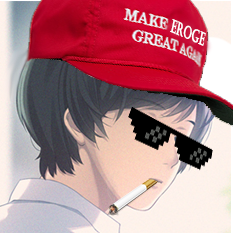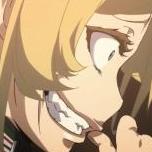Leaderboard
Popular Content
Showing content with the highest reputation on 10/14/17 in all areas
-

Post pics you like (Powered by Jun Inoue™)
Dreamysyu and 2 others reacted to Kenshin_sama for a topic
This is why you don't take advice from people on Facebook.3 points -

SakuSaku Info and Discussion
Nandemonai and one other reacted to TexasDice for a topic
Okay. Japan, listen. We talked about this. Remember when everyone was agreeing that this Should never happen ever again? So how do you explain this, Japan? How dare you do this to me again. Eroge was a god damn mistake. EDIT: Was this software solely created to make me mad? w2 points -
2 points
-
Hi! My name is Zakamutt and I can't help myself from making this joke. Gomen nasai but I am mou shindeiru anyway so you can't do anything to nyatashi anyway. Shumi wa 本とかノベルゲとかを読む、そしてランダムで日本語で書く事。Aaaaaaaaaaaaaaaaaaaaaaaaaaaaaaaaaaaaaaaaaaaaaaaaああああああああああああああああああああああああああああああああああファック I don't understand the foreignese in this picture but I'm sure some of you do. It's probably saying something like "anyone who uses this picture is a big poopyhead lol" um I just like... k.1 point
-
1 point
-

Hello, mates!
Jamie D.W. reacted to Kurisu-Chan for a topic
Welcome and bienvenue to Fuwanovel...oh right, i'm not relevant nowadays...wait, when was i relevant actually?1 point -
Lets be friends
Kurisu-Chan reacted to Bunnypop for a topic
Hello everyone, I'm Bunnypop, 17 yo from Europe. I got a huge interest in games, manga and anime. My dream is to create a visual novel (you can see an example of my art in my avatar)! Thought I mostly create cute, girly and cozy drawings, I can do gore and horror art too! Hope we all can be friends!1 point -
Next time when you reset, keep the .SAV's in a different folder, you can reuse them and keep your data.1 point
-

My odd experiences with Anime icons
BookwormOtaku reacted to Clephas for a blog entry
Anime, if you limit it to Japanese animation (the actual word in Japanese refers to all animated shows, but I'm limiting the definition to J-animation), has been around since 1917, but anime as we know it, in its earliest distinct form, was born in the 1960's. My personal experience with anime (where I understood it to be anime, as opposed to my Voltron experience in the mid eighties as a kid) began in 1992, with Record of Lodoss War (the OVA series, not the TV series), drawing me in and making me a fan instantly. At the time, certain anime were considered to be 'icons' of the medium... Astro Boy, Dragonball, Ranma, Mobile Suit Gundam, etc. After becoming a fan of anime, I was introduced to them, and by the time I moved to Austin in 1998, I'd already seen three of my old favorites achieve 'icon' status (The Slayers, Tenchi Muyo, and Yuyu Hakusho). Now, it is really, really weird to see something you watched almost as it came out being referred to as 'iconic'. Moreover, seeing something you liked become referred to as genre-defining (Noir, Love Hina, Ai Yori Aoshi) can leave you with complicated feelings... it tends for me to be an odd mix of pride and embarrassment. Now, most of the time in the US, TV shows are generally only considered iconic when they've run for many seasons or won a number of academy awards... but most of the time, anime that are considered iconic are made so by fan acclaim, and the line where famous ends and iconic begins tends to be rather murky. I doubt many with a strong knowledge of the last forty years of anime would fail to consider Legend of the Galactic Heroes or Tenchi Muyo to be iconic. However, if you were to ask one who had lived through those times at what point they became so, you would probably just get a helpless shrug in return. Legend of the Galactic Heroes is considered by many to be the peak of the now-deceased anime space opera sub-genre (since only a few have been made since and none even came close to it in scale or quality). The fact that it manages to maintain a massive fanbase amongst sci-fi anime fans despite its dated visuals says everything that needs to be said about the artistic value of the series. Tenchi Muyo, on the other hand, is considered a genre-definer. It combined one old and time-honored anime genre - science fantasy - with at home slice-of-life antics with a spice of romance, essentially pioneering the idea that action science-fantasy series could also have a strong basis in daily life comedy and romance (If you can't figure out how that has effected things to this day, then you aren't looking hard enough at the trends in otaku media over the last twenty years). These are just two examples... even in the last ten years, I've seen anime that I watched out of boredom suddenly become idolized a few years after their release as genre pioneers or an example of what is best in a genre... In other words, this whole post is just a ramble about how I'm starting to feel old when I look back at how long my otaku live has been, hahaha. Edit: To be clear, anime was my first entryway into the otaku life as I knew it. I love anime to this day, and while I'm sad at how the medium has stagnated (like most otaku media have stagnated in the last ten years or so) I have faith it will eventually recover. After all, I find at least one new anime worth adoring with each year that passes. Edit2: A few more things... I've also seen treatment of anime fans by society change dramatically since I was a kid. I don't remember the last time I heard the question 'Are you watching cartoons?' and if you shake three people in an urban area, at least one of them regularly watches the newest stuff on crunchyroll. It is odd not to be an extreme minority in an extremely niche community, considered to be childish or strange for watching a gory fantasy anime rather than a sitcom, lol.1 point -
1 point
-
I enjoyed the VN as a whole but I've gotta say that Sasara's route, while filled to the brim with great ideas, was pretty bad. The story made no sense, the actual romance was executed horribly though it was good in concept, and perhaps worst of all was that the ending, while again good in concept, was executed horribly. It came completely out of left field and completely went against everything that had been shown not even five minutes prior without even attempting to bridge the gap somehow to lessen the slap to the face. Basically, there was loads of potential throughout the route but due to horrible execution and at times lazy writing it just didn't work, at all.1 point
-

To Heart 2 Sound and Music Skipping
ittaku reacted to Fred the Barber for a topic
Teamwork makes the dream work.1 point -

Frontwing will localize Subahibi this year
Silvz reacted to Tamaki Sakura for a topic
Some VN are just like that. I guess the idea is that the player mainly cares about the female characters, and keeping the cast small saves money.1 point -

Post pics you like (Powered by Jun Inoue™)
Flutterz reacted to Kenshin_sama for a topic
I'll get back to you after the 25th.1 point -
1 point
-

should I read grisaia or fate first?
akaritan reacted to Overlord87 for a topic
Fate is a great visual novel, Grisaia "just" a very good one (a little overhyped imho). So, I'd say Fate, unless you like Grisaia's genre more.1 point -

should I read grisaia or fate first?
akaritan reacted to alden_0023 for a topic
I'd go Fate. Then wait until the 18+ release of the Grisaia no Rakuen before starting, so you can finish reading. Bec Grisaia no Meikyuu cliffhanger made me lose sleep.1 point -
1 point
-
MOST BRILLIANT ANIME QUOTES ~1 point
-
1 point
-

Researching the link between theory and practice of translation
Akshay reacted to Akimoto Masato for a topic
Did you have to bring him down like a falling tree? Jk love you1 point -
There is a science to making surveys. Random questions will usually give you very little while carefully thought out questions can provide a lot. First of all, every single word in each question needs to be considered because it's important that it's precise and that all readers agree to the meaning. I don't think you are doing well in this regard. Also keep in mind that not everyone here are native English speakers and there are translators, who translates to something other than English. This can make using academic English even worse. "1. Which of the following areas best describe where your translation practice falls?" What does this mean? If it how you practice to make you better, how you practiced in the past or the kind of of translation work you do now? The answer activist is not good either. I view activists as people who likes to cause obstructions. I think something like "unpaid hobby translator" is more in line with what you are thinking. You also entirely miss the unpaid translators, who work to produce something they hope can be used to get a paid job later. "2. Which of these pathways best describes how you began your translation practice?" Since you post here, an obvious answer is missing, which is starting out with visual novels, meaning it falls into the category of hobby. Again the word practice might not be read identical by all people. Also what covers academia? You could have foreign languages in school where you have translation assignments. This is in fact mandatory to learn English in most non-English speaking countries. Some schools offer Chinese or Japanese as optional for 1-2 years and I bet you that people going through that will be nowhere near the level needed to translate when they are done. Some people could say academia due to having Japanese at school for one year while others require attending a university or similar studying the language. This will again make the replies less useful than wanted. "3. How often do you engage in personal reading / research on translation?" I assume this is studying and not "how often do you do translation work?". You might want to ask both because weekly means something different if the person works daily or weekly. Also how is reading/research defined? Looking up in a dictionary? Looking up kanji? (I think all translators does that in each translating session). It could also be something other than that, like studying grammar. How about running each sentence through tools like jparser or jisho? Also I have come across both people who translates on all 5 weekdays or only during the 2 days of the weekends, neither of those can be answered clearly with the options you provided. In fact mentioning kanji and the tools related to it, does your survey even take into account that it's Japanese and that the character sets themselves (all 3 of them) are a challenge? This adds an issue you don't get when translating between two languages using the same character set, like the Latin characters. I will skip the control questions to counter the bias from not asking a representative demographic of translators. You have none of that, which is usually quite bad, but at the same time your demographics are so unknown that I wouldn't even know where to start to make such a correction. It's like like political surveys where correction questions can be as simple as "who did you vote for last time". Another obvious question for visual novel translation is if the translator works alone or in a group and if it's in a group, is it done in a way where translators can learn from each other? Single person translations of VNs are actually fairly rare meaning ideas and insights spread from person to person, both regarding work organization and the work itself. How the work is organized and how the text is available matters for the resulting quality. For instance the same text can be worked on by 3 people, first translation, then editing to get a more natural English flow between the lines, then translation verification done by a translator other than the first one (checking both translation and if editing altered the meaning by accident). Interaction between people here can provide useful feedback. I hope you don't mind that I might have been a bit harsh on your survey, but I did it mainly to put focus on the quality of the survey itself, hence how useful the results are. I would actually be interested in the result, particularly if you do something to improve the quality.1 point
-
Activist makes it sound like I'm doing it for some political reason, so Other>Fan. Really though it's just kind of fun sometimes, I wouldn't do it otherwise. I'm not exactly diligent though. The "path to translation" question is kinda weird for self-taught fan translators. The only released vn translation I did, one of the sex scenes for Maki Fes, I did mostly because one of my friends asked and it seemed fun. I got the scripts for other vns the same way, and you can find ways to extract vn scripts on your own if you look for tools around the net. With regards to theories of translation, I think a lot of academic writing has sort of filtered down into more digestible articles. I recently read the first two links listed on this page, and it's kind of the more highbrow version of the eternal liberal/literal debate in most cases. The concept of functional equivalence, or whatever they call it now, is very much a meme that has spread throughout the community, just not by that name. The current fanbase for Japanese media is to an uncomfortably large extent plagued with demands for stiff, literal translations, which is why you'll see very few professionals arguing for more literal translation styles as they have a better grasp of the concepts. The story goes that early anime / game localizations had a tendency to go perhaps too far with changes and censorship, and so the stilted language produced by most fan subtitles at the time began to be seen as a sign of authenticity. Now we have a generation of people who grew up on weebsprach. It's horrible. There are people legitimately writing things worse to cater to them.1 point
-
Any Comedic VN Recommendations?
Thatcomicguy reacted to Tweek91330 for a topic
A little late, but you could try Tsujidou-san no junai road. I myself am playing it right now (for about 10 hours), it's light and funny so far.1 point -

Any Comedic VN Recommendations?
Thatcomicguy reacted to KainLegacy535 for a topic
Ikinari anata koi suru its fun as hell, it have a little much of H, but even that is funny.1 point -

What do you seek from VNs?
Chronopolis reacted to Tyr for a topic
You're probably also watching Anime for the PLOT! He's not a racist, he's is a culturist. A racist thinks certain people are inferior for superficial reasons like skin color or the place of birth. A culturist however dislikes certain cultures based on his own morals and values which these cultures don't respect or are working against. Being a culturist is the inevitable conclusion to every human being who has a strong sense of what is right or wrong and does not just blindly accept other ideas and concepts just for the sake of being tolerant when they are (in his opinion) clearly wrong. There is much too dislike about Japan. I could count dozens of things that are (in my opinion) wrong with this country. But this wrongness is also the reason why this country can produce so many stories and other pieces of art that resonate with so many people around the world. I don't want to live in Japan, but I'll gladly take it's products.1 point -
1 point






